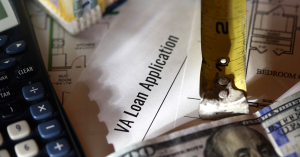If you’re a veteran who is considering buying your dream home, you’re probably already aware of the VA Home Loan program. It’s a fantastic benefit available to our men and women in uniform.
But before you start daydreaming about your dream house, let’s talk about the first real step in the home buying process, prequalification.
Understanding the VA Home Loan Prequalification
Prequalification is kind of like warming up before the big game. It is where your lender takes a quick look at your financial status to estimate how much they might be willing to lend you. But remember, it’s just an estimate. It’s not a guarantee or a loan approval.
And don’t confuse prequalification with preapproval, now. Preapproval is a more detailed process where the lender verifies your financial information and confirms exactly how much they will lend you. But we’ll save that topic for another day.
The Benefits of VA Home Mortgage Prequalification
What are the goals of prequalification and why should you care about it? For starters, it gives you a good idea of your price range before you fall in love with a house you can’t afford. It’s a dose of reality.
Plus, having that prequalification in your back pocket can give you a leg up when it comes to negotiations. Sellers are more likely to take you seriously if they know you’re prequalified. It’s like walking into a car dealership with cash in hand.
Step-by-Step Guide to VA Home Loan Prequalification
Alright, let’s dig into the steps you need to take to get prequalified for a loan.
Step 1: Confirming VA Loan Eligibility
First things first, make sure you’re eligible for a VA loan. This typically means you’ve served 90 consecutive days of active service during wartime, or 181 days during peacetime, or you’ve given 6 years of service in the Reserves or National Guard. Your spouse may also qualify if you died in the line of duty or from a service-related disability.
| Eligibility Criteria | Description |
|---|---|
| Wartime Service | 90 consecutive days of active service |
| Peacetime Service | 181 days of active service |
| Reserves/National Guard Service | 6 years |
| Spousal Eligibility | If a service member died in line of duty or from a service-related disability |
Step 2: Obtaining Certificate of Eligibility (COE)
Once you’ve confirmed your eligibility, you’ll need to obtain a Certificate of Eligibility (COE) from the VA. This certificate tells your lender that the VA backs your loan. And don’t worry, obtaining this certificate is usually a straightforward process, which can often be done online.
Step 3: Providing Financial Information
Next, your lender will need some basic financial information about your income, debts, and credit history. Remember, this is a casual conversation, not an interrogation. You’re just giving them a snapshot of your financial status.
Step 4: Receiving the Prequalification Letter
After crunching the numbers, the lender will give you a prequalification letter. This letter gives you an idea of how much they might be willing to lend you. But remember, it’s an estimate, not a guarantee.
After Prequalification: What’s Next?

So you’ve got your prequalification letter. Now what? It’s time to start shopping for your new home! But remember, just because you’re prequalified for a certain amount doesn’t mean you have to spend that much. Stay within your budget and don’t let a real estate agent push you into a more expensive home.
In the meantime, keep your financial situation stable. Don’t go buying a new car or racking up credit card debt. Any big changes could affect your final loan approval.
Let’s expand our discussion. Understanding the Department of Veteran Affairs Home Loan program is great, but there’s a whole world of related information out there that can help you make an informed decision.
Understanding the VA Home Loan Program
Let’s start with the basics. The VA Home Loan program is an incredible benefit for our veterans, providing a government-backed mortgage loan with no down payment, competitive interest rates, and no private mortgage insurance. It’s like a golden ticket to homeownership.
The Role of Credit Score in VA Loan Prequalification
It’s time to chat about credit scores. While Uncle Sam’s VA is gracious and doesn’t require a minimum credit score, the lenders will also give you the money that aren’t as lax. Typically, they look for a score around 600. But remember, that’s just the starting line. If you can pull off a higher score, you’re likely to get a lower interest rate, which means a smaller monthly mortgage payment and less money shelled out over the life of your loan.
But what if your credit score looks more like a fixer-upper than a shiny new mansion? Well, don’t worry. Your credit score isn’t etched in stone; it’s more like a sand dune shaped by the winds of your financial habits. Pay down your debts and make your payments on time. Keep your credit card balances low compared to their limits. And don’t rush to open new lines of credit or close old ones before applying for a loan. Follow these steps and watch your credit score steadily rise, making you a more appealing candidate when it’s time to prequalify for that home loan.
VA Loan Preapproval
https://www.youtube.com/watch?v=DlRkHNQlsJI
Alright, we’ve talked about prequalification, but now it’s time to move to the next step of the home loan process: preapproval. Now, if prequalification is like window shopping, VA loan preapproval is putting that dream home into your shopping cart. It’s a much more serious commitment and requires a more thorough evaluation of your financial situation.
- The Preapproval Process: Unlike prequalification, which is based on a brief overview of your finances, preapproval involves a deep dive into your income, debts, credit reports, and employment status. A lender will review your documents, conduct a hard credit inquiry, and evaluate your ability to repay a loan.
- Getting Preapproved: The preapproval process begins with filling out an official mortgage application and providing the lender with the necessary documentation. This typically includes W-2 forms, paycheck stubs, bank statements, and tax returns. The lender will then verify your income and assets, check your credit, and assess your overall financial situation.
- Why Preapproval Matters: Securing preapproval means a lender has committed to loan you up to a certain amount, provided the property appraises for enough value. It’s a powerful tool when house hunting because it shows sellers you’re serious, financially ready, and capable of following through with the purchase. In hot real estate markets, being preapproved can give you a significant edge over buyers who aren’t.
- Preapproval Isn’t a Guarantee: While preapproval is a strong indication of your ability to secure a loan, it’s not a guarantee. It’s important to know the factors like changes in your financial situation, the appraisal value of the property, or fluctuations in interest rates could affect the final mortgage approval process.
- Keeping Preapproval Current: Preapproval letters have a shelf life, often valid for 60-90 days. If you don’t find a home within that period, you’ll likely need to reapply or update your preapproval.
Remember, getting preapproved for a home loan is a significant step in your journey to homeownership. It shows you’re a serious buyer and provides peace of mind in your home search.
VA Mortgage Limits and Extra Fees
When it comes to VA loans, there’s no limit to how much you can borrow, but there is a limit to how much the VA will guarantee. This is called the VA loan limit. It changes yearly and varies by county. There’s also a funding fee that goes directly to the VA to help keep the program running. This fee can be rolled into the loan amount, so you don’t have to pay it out of pocket.
Other Home Loan Options

Remember, the VA loan isn’t the only game in town. Conventional and FHA loans have their advantages too. But for eligible borrowers, the VA loan’s benefits often outweigh the competition.
Let’s examine some widespread types of home loans:
- Conventional loans: These babies come from private lenders and aren’t government-backed. You’ll need a decent credit score and a bigger down payment than for government-backed options.
- FHA loans: Thanks to the Federal Housing Administration, folks with lower credit scores and smaller down payments can consider these loans.
- USDA loans: Tailored for low to moderate-income borrowers in rural areas, these U.S. Department of Agriculture-backed loans bring no down payment and low-interest rates to the table.
- Jumbo loans: For those who need to borrow beyond Fannie Mae and Freddie Mac’s conforming loan limits, jumbo loans are your ticket to larger amounts.
- Fixed-rate mortgages: Rock steady, these loans offer the same interest rate for their entire life, making your monthly payments predictable.
- Adjustable-rate mortgages (ARMs): With interest rates that change over time, ARMs start off low but could eventually pinch your wallet.
- High-balance loans: Need to borrow more than the conforming limit but don’t want a jumbo loan? Fannie Mae and Freddie Mac’s high-balance loans have got you covered.
- Second mortgages: Supplement your primary mortgage with home equity loans or home equity lines of credit (HELOC), also known as second mortgages.
- Government-backed loans: Ideal for homebuyers in search of smaller down payments and friendlier credit requirements, these loans, like FHA, VA, and USDA loans, have your back.
Compare your options and see what makes the most sense for your situation.
Gearing Up for a Full Lender Application
Once you’ve got your prequalification letter, you’re ready to move onto the big league, the full loan application process. This involves a more thorough review of your financial situation, including an appraisal of the home you want to buy. So you want to make sure to keep your finances stable and get ready for a deep dive.
The Role of Real Estate Agents in the VA Home Loan Preapproval
A real estate agent can be a great ally in your homebuying process, especially one who’s familiar with the VA loan process. They can guide you through the housing market, negotiate with sellers, and help you navigate any hiccups along the way.
The Appraisal Process for VA Home Loans

Ah, the appraisal process, is a crucial step in the Veterans Affairs Home Loan journey. Did you know that VA loans have specific requirements to ensure you’re buying a safe and sound home? Let’s break it down further with a handy list of key points:
- Minimum Property Requirements (MPRs): The VA has established MPRs to set baseline standards for the condition of homes purchased with a VA loan. These requirements cover various aspects of the property, including safety, soundness, and sanitation.
- Appraiser’s Role: A VA-approved appraiser plays a vital role in the process. They estimate the value of the home, making sure you’re not overpaying. Additionally, they inspect the property and it needs to meet the VA’s MPRs, identifying any potential issues that need attention.
- Value Estimation: The appraiser assesses the property’s value to ensure that the price aligns with its true worth. This step protects you from paying more than the property’s fair market value.
- MPR Inspection: During the appraisal, the appraiser thoroughly inspects the property, examining various factors such as the condition of the roof, electrical systems, plumbing, and overall safety. If any issues are found, they’ll be noted in the appraisal report.
- Protecting Your Investment: The appraisal process serves as a safety net, safeguarding you from unexpected repair costs and potential risks associated with the property. By adhering to the MPRs, the VA ensures that you invest in a home that meets certain standards.
Remember, the appraisal process may seem like an additional hurdle, but it’s designed to protect you and your investment. It ensures that the home you’re purchasing not only meets your expectations but also meets essential safety and health standards.
VA Home Loan Refinancing Options
Already a homeowner? You might be interested in VA loan refinancing options. You can lower your interest rate or tap into your home’s equity. Just be sure to crunch the numbers and make sure it makes financial sense before jumping in.
Closing Costs and Fees
Before you sign on the dotted line, be sure to understand the closing costs and fees. These can include loan origination fees, appraisal fees, and title insurance. Some costs can be negotiated, so don’t be afraid to ask.
Financial Tips for VA Home Loan Borrowers

And last but not least, here are some quick financial tips. Budget wisely for your new home, save for unexpected costs, and maintain your financial stability during the loan process. Remember, your home should be a blessing, not a financial burden.
Whew! That’s a lot of information, but knowledge is power. The more you understand about the VA Home Loan process and all its related topics, the better prepared you’ll be to make smart decisions on your journey to homeownership.
Ready to Take the First Step?
And there you have it! Prequalification isn’t just a bureaucratic hoop to jump through, it’s your opening act on the grand stage of home buying. It’s like having a secret weapon in your pocket. It helps you get a clear-eyed view of what you can afford, so you’re not left heartbroken by falling in love with a home that’s out of your reach.
So, before you hit the open house circuit, or start obsessively refreshing real estate websites for the latest listings, take a moment to get pre-qualified. It’s a little effort upfront that can pay off big time in your journey to homeownership. After all, in the race to find your dream home, a head start doesn’t hurt!
Frequently Asked Questions
What is the difference between prequalification and preapproval?
Prequalification is like dipping your toe in the water, it’s a basic assessment of your creditworthiness based on the information you provide. Preapproval, on the other hand, is like diving in headfirst. It’s a more thorough evaluation, usually involving a detailed look at your financial documents and a hard credit check.
Do I have to use my VA loan eligibility?
Not at all. VA loan eligibility is a benefit you’ve earned, but it’s not a requirement. If a conventional loan or another type of mortgage makes more sense for you, go for it.
What does a VA loan cover? Can I use it to buy a vacation home or investment property?
VA loans are designed for primary residences, that’s realtor speak for the place where you hang your hat most of the time. So no, you can’t use it to buy that beachfront vacation rental or an investment property.
What if I have a low credit score? Can I still qualify for a VA home loan?
While most lenders prefer borrowers with a credit score of at least 600, it’s not a hard-and-fast rule. Some lenders may work with borrowers who have lower scores. Remember, your credit score is like a first impression, it matters, but it’s not the only thing lenders consider.
How long does the prequalification process take?
The VA loan prequalification process is like a speed date, it’s quick, often taking just a few minutes over the phone or online. The preapproval process, on the other hand, is more like a dinner date; it’s more involved and can take a few days to a week.
I’ve received my prequalification letter. How long is it good for?
Prequalification letters are a bit like milk, they do have an expiration date. Typically, they’re good for 60 to 90 days. If you haven’t found a home before it expires, you’ll likely need to get re-prequalified.






